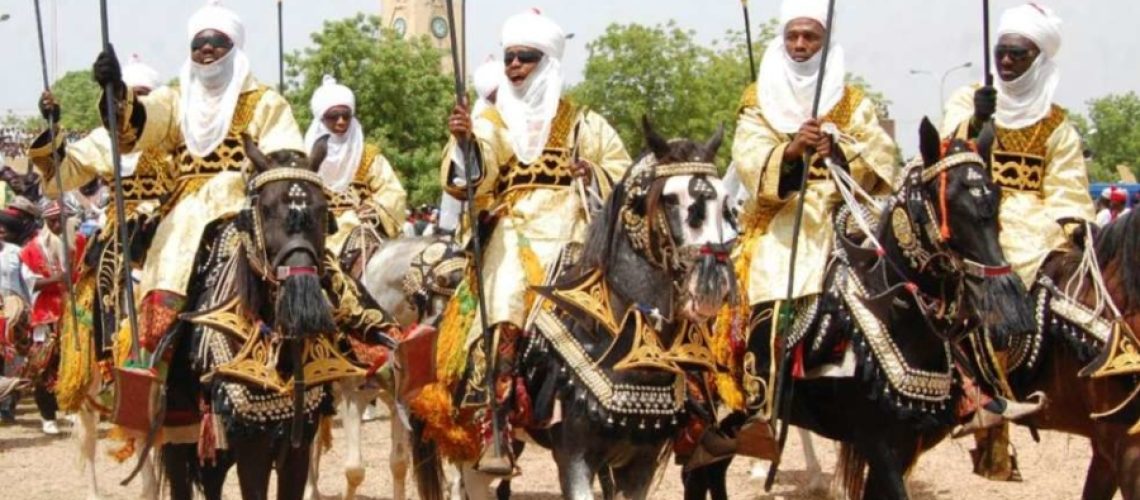The Hausa and Fulani have been living together for centuries long before Danfodio, the religious reformer that led the Fulani Jihad of 1804 in Hausaland, was born. The relationship between the Hausa and the Fulani passed through three distinct phases over time
(i) Before the Jihad when the relationship was that of ‘host’ and ‘guest-cum-subject’. It should be noted that Danfodio was born and bred in Hausaland.
(ii) During the Jihad the relationship became that between ‘Amir’ (Amir is Arabic for leader, also known as Emir in English, the title by which traditional rulers across the Sokoto Caliphate are known today) and Jama’ah (adopted by Danfodio to qualify his followers), where the Fulani was leader and both Hausa and Fulani people are followers.
(iii) After the Jihad, the relationship became that of a King (Hausa: sing. Sarki; plural Sarakuna) and subjects (Hausa: talakawa). It was at the beginning of the third phase that the Hausa people realised, a bit too late, after the dust of the Jihad had finally settled, that they have been hoodwinked. They had traded their Hausa masters with a new set of Fulani masters!
Hausaland has been under the rule of Fulani Emirs since the Sokoto Jihad of 1804. The Hausa people watched as the powers of the Fulani emirs diminished from absolute power to the merely ceremonial status today.
In recent years we started witnessing a disturbing phenomenon. Whenever a new emir is appointed in Hausaland, the emphasis will be on his Fulani identity, not even Islam, the utility vehicle upon which the Fulani rode to power in Hausaland. You hear or read interesting statements like ‘the 14th Fulani Emir of Kano’ or ‘the 19th Fulani Emir of Zazzau’!
Zazzau and Kano are parts of Hausaland! Why call a new emir of, say, Zazzau as the xth Fulani emir of Zazzau? Why not simply new emir of Zazzau? Why the emphasis on the fulaniness of an Emir in Hausaland where the bulk of the people are Hausa?
This recent unfortunate development has some consequences.
First, it introduces tribal identity into an emirate system that is based on Islam thereby not only dividing the emirates along tribal lines but also conferring on the average Fulani, a false sense of superiority and entitlement over the average Hausa in Hausaland.
Second, it puts to question the legitimacy of an emir whose key qualification for the throne of an Islamic emirate is his accident of birth.
Third, it makes the Hausa people, who supported the Fulani Jihadist against their old kings, to loss their sense of belonging and identity with the emirates in spite of the sacrifices of their fathers.
This emerging trend of publicly and officially attributing fulaniness to the person and office of emirs in Hausaland grossly undermine the pride, confidence and self-esteem of the average Hausa person. The Hausa is now seeing himself as an orphan, belonging to the lowest caste, in Hausaland. Something has to be done to restore and boost the dignity, pride and confidence of the Hausa person in Hausaland.
Danfodio’s decision to appoint Fulani Emirs in ‘jihadified’ Hausaland, in spite of the abundance of Hausa people versed in Islamic religion even among his followers and disciples, people like the famous Malam Abdulsalami, followed by the transformation of Amirship to Monarchy by his son Sultan Muhammadu Bello, led to the establishment of Fulani monarchical dynasties across Hausaland which, consequently, ensures that Hausaland remain under Fulani rule!
These monarchical dynasties that confers hereditary dignity on the Fulani in Hausaland and beyond, were later supported, consolidated and sustained by both the British colonial policy of indirect rule and Nigeria’s post-colonial governments, thereby giving traditional institutions in Nigeria in general, and in Hausaland in particular, a seal of permanency!
No people or tribe will like to live permanently under the rule of another people or tribe, even if the rule is merely ceremonial, no matter how magnanimous and generous the ruling tribe is.
Over the years, new traditional chiefdoms and emirates were created across the country, and within the caliphate, since the coming of the Whiteman and Nigeria’s Independence. Smaller tribes and ethnic groups, much smaller compared to Hausa, are now enjoying traditional self-rule and determination while the Hausa, one of the largest tribes, remain under Fulani Emirs.
Take for instance, the present day Kaduna State, which had, at the time of British conquest, only Zazzau and its three vassals states, it now has 32 independent Chiefdoms out of which 10 are of first class status! Almost each tribe, no matter how small has its chiefdom.
For how long will Hausa traditional institutions remain exclusively under the Fulani?
Though the Hausa cannot seek for separate Chiefdoms from the Fulani, he can, and should be allowed to, aspire to the position of Emir in the Emirates within Hausaland!
The way forward is to reform the succession laws for all thrones in the emirates across Hausaland in such a way that descendants of the old Hausa kings can also contest, and be selected, alongside the descendants of the jihadists on a level playing ground. The old Hausa kings were Muslims. Their descendants are Muslims, and can compete with the descendants of the Jihadist in any field of Islamic scholarship.
To this end I wish to recommend the Zazzau Model for its utility and practicability. Zazzau has 4 Ruling Houses: Malian Fulani, Katsina Fulani, Borno Fulani and the Sullubawa Fulani. Whenever, the throne of Zazzau is declared vacant, eligible princes from each of the 4 ruling houses are free to contest. To these 4 ruling houses, in Zazzau for example, we can add a fifth one, the Hausa House.
However, the Zazzau model suggested for Hausaland with descendants of old Hausa Kings included, should not include the Sultanate in Sokoto and the Emirate of Gwandu. These two emirates should remain permanently and exclusively to the heirs of Shehu and Abdullahi respectively.
That notwithstanding, in Sokoto State, the position of Sarkin Gobir of Sabon Birni should be upgraded to a first class Emirate.
We are in a democracy. The beauty of democracy is that it allows people to take their destiny in their hands and decides for themselves.
The good news is that traditional institutions are yet to have a place in our constitution, therefore the issue of revisiting the succession laws in the emirates of Hausaland is exclusively within the purview of the respective state governments, and does not require constitutional amendments.
I am therefore, using this opportunity in calling on the Hausa and the friends of Hausa, especially the Fulani, in the respective states, as well as well-meaning Nigerians everywhere, to help support this struggle for the restoration of the pride, dignity, independence, identity and self-determination of the Hausa in Hausaland by pushing forward this agenda to its logical conclusion in the interest of fairness and equity.
I am sure this is not too much a price for the Hausa to ask of his compatriots. As the dog in Achebe’s Things Fall Apart said “If I fall down for you and you fall down for me, it is play”. Yes, it is play, for the Hausa is a friend to all Nigerians.
Aliyu Ammani 24/02/21
PS: this is an abridged version of a 3000+ word work in progress.

